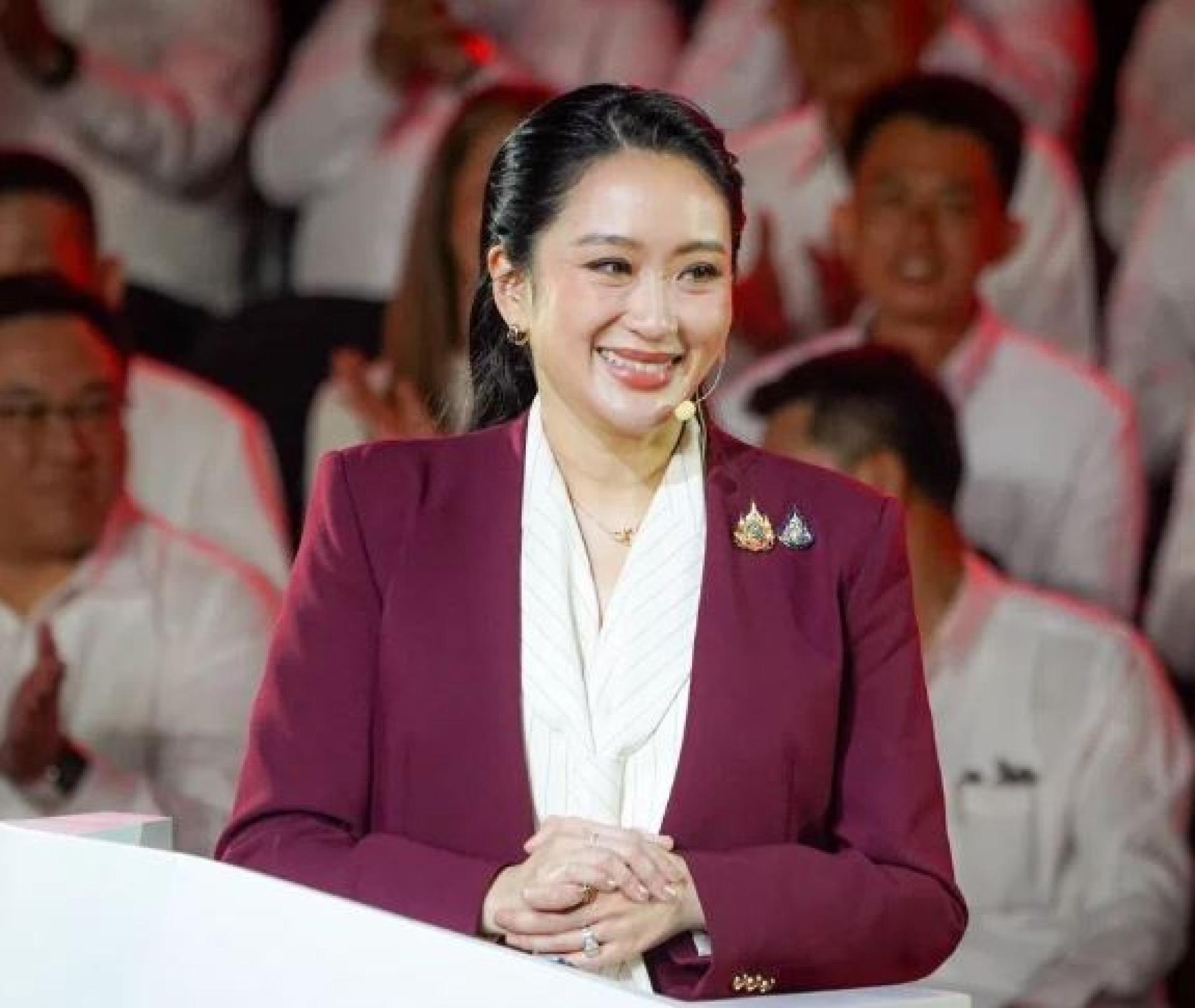Pheu Thai Party leader and former Prime Minister Paetongtarn announced that the party will nominate three candidates for the prime minister position in the next general election, but there will not be any members from the Thaksin family on the list. Scholars point out that Pheu Thai has long relied on the Thaksin family's political influence, and without Thaksin's support in the campaign, the party may struggle to secure enough votes to return to power.
On Tuesday (October 7), during a party event themed “Revitalize Pheu Thai, Revitalize Thailand,” Paetongtarn announced that the list of candidates has been finalized and will be revealed at the appropriate time, but she and other family members have already been excluded. She emphasized that this event is an important step for Pheu Thai to rally its core strength following changes in the political landscape. The party will review its experiences and carry out internal reforms to face fiercer political competition.
Pheu Thai has suffered several setbacks this year. At the end of August, Paetongtarn lost her qualification as Prime Minister after the Constitutional Court ruling on the “phone call scandal.” In September, her father and former Prime Minister Thaksin was sentenced by the Supreme Court to return to prison for one year. That same month, the Move Forward Party, the largest opposition in parliament, supported Bhumjaithai Party leader Anutin to take the PM post, shifting Pheu Thai from the ruling coalition to the opposition.
In response to concerns about Pheu Thai’s future, Paetongtarn said: “Many people think Pheu Thai has come to an end, but I disagree. I believe we can unite, fight, and keep moving forward.”
On the same day, former Deputy Prime Minister and Transport Minister Suriya was appointed as Pheu Thai's election director. He expressed strong confidence: “Pheu Thai's candidates will directly compete with the Move Forward Party. The Move Forward Party’s popularity is declining... I believe we can win at least 200 seats.”
He predicted that the Move Forward Party may secure fewer than 100 seats in the next election, while Bhumjaithai may increase to about 120 seats, though still lower than Pheu Thai.
Michael Montesano, Senior Fellow at Singapore's ISEAS–Yusof Ishak Institute, told Lianhe Zaobao that Pheu Thai’s solid support base primarily comes from the Thaksin family's appeal. If Thaksin cannot campaign for the party in the next election, Pheu Thai may become just one of several mid-sized parties in parliament.
He anticipates that after the next election, the Thai Parliament will see three main parties closely matched in strength, making forming a coalition government highly challenging.
Thai current affairs commentator Pravit Rojanaphruk believes Pheu Thai's election chances will hinge on the Anutin government's performance and the policies Pheu Thai introduces in the future. “If the new candidates are well received by voters, it will be a blessing; if not, it could become a source of disaster.”
Earlier rumors suggested that Thaksin’s son-in-law, Nuttaphong Kunakornwong, might be nominated as a prime ministerial candidate, but Paetongtarn’s statement has officially dispelled this rumor.
Pravit noted that Nuttaphong did not receive broad support at the time, so Pheu Thai may prefer to put forward candidates with stronger professional reputations and experience. Montesano added that given the political experience of Thaksin's sister, former Prime Minister Yingluck, the Thaksin family is now more cautious and reluctant to let family members enter politics easily, a view reinforced by Paetongtarn’s recent experiences.
Pheu Thai has suffered several setbacks this year. At the end of August, Paetongtarn lost her qualification as Prime Minister after the Constitutional Court ruling on the “phone call scandal.” In September, her father and former Prime Minister Thaksin was sentenced by the Supreme Court to return to prison for one year. That same month, the Move Forward Party, the largest opposition in parliament, supported Bhumjaithai Party leader Anutin to take the PM post, shifting Pheu Thai from the ruling coalition to the opposition.
In response to concerns about Pheu Thai’s future, Paetongtarn said: “Many people think Pheu Thai has come to an end, but I disagree. I believe we can unite, fight, and keep moving forward.”
On the same day, former Deputy Prime Minister and Transport Minister Suriya was appointed as Pheu Thai's election director. He expressed strong confidence: “Pheu Thai's candidates will directly compete with the Move Forward Party. The Move Forward Party’s popularity is declining... I believe we can win at least 200 seats.”
He predicted that the Move Forward Party may secure fewer than 100 seats in the next election, while Bhumjaithai may increase to about 120 seats, though still lower than Pheu Thai.
Michael Montesano, Senior Fellow at Singapore's ISEAS–Yusof Ishak Institute, told Lianhe Zaobao that Pheu Thai’s solid support base primarily comes from the Thaksin family's appeal. If Thaksin cannot campaign for the party in the next election, Pheu Thai may become just one of several mid-sized parties in parliament.
He anticipates that after the next election, the Thai Parliament will see three main parties closely matched in strength, making forming a coalition government highly challenging.
Thai current affairs commentator Pravit Rojanaphruk believes Pheu Thai's election chances will hinge on the Anutin government's performance and the policies Pheu Thai introduces in the future. “If the new candidates are well received by voters, it will be a blessing; if not, it could become a source of disaster.”
Earlier rumors suggested that Thaksin’s son-in-law, Nuttaphong Kunakornwong, might be nominated as a prime ministerial candidate, but Paetongtarn’s statement has officially dispelled this rumor.
Pravit noted that Nuttaphong did not receive broad support at the time, so Pheu Thai may prefer to put forward candidates with stronger professional reputations and experience. Montesano added that given the political experience of Thaksin's sister, former Prime Minister Yingluck, the Thaksin family is now more cautious and reluctant to let family members enter politics easily, a view reinforced by Paetongtarn’s recent experiences.
